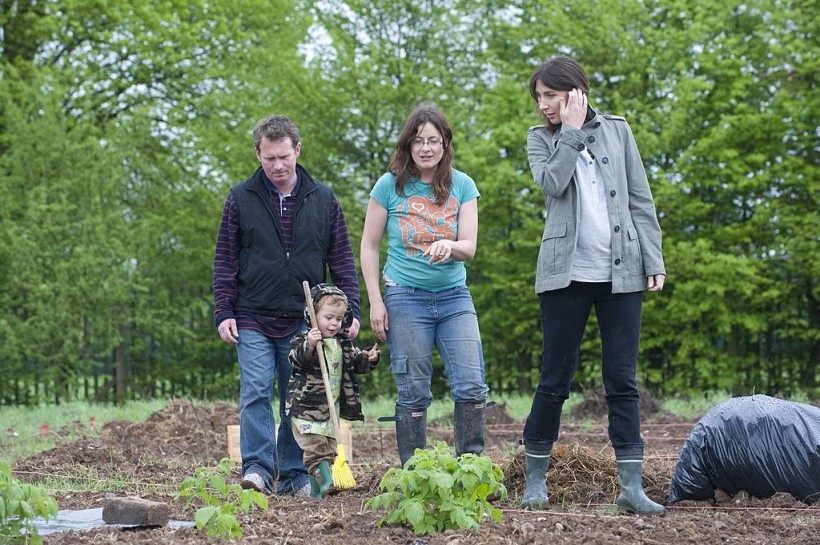Gardening, especially sustainable gardening, has incredible advantages for the environment, your diet, and your overall health. Even though there is an initial time and financial investment necessary, results can be seen quickly.
Here are the things you should know to start growing your own food at home-with the least amount of waste.
Health Advantages
 (Photo : Jamie Wiseman/WPA Pool/Getty Images)
(Photo : Jamie Wiseman/WPA Pool/Getty Images)

Access to wholesome food right away is the benefit of starting a sustainable garden that is most visible, as per the Center of Nutrition Studies.
You don't need to be concerned about chemical residue because focusing on sustainability implies avoiding the use of pesticides and herbicides.
Additionally, you obtain the best nutrient concentration from produce when it is harvested, prepared, or conserved at the height of ripeness.
Growing your own food also enables you to explore with a wide range of fruits and vegetables that aren't always simple to acquire at supermarkets, so allowing you to diversify your diet.
Additional advantages to physical and mental wellness come through gardening. You can reduce stress and improve your mood by planting, watering, mulching, and weeding outside and being active.
You'll be inspired to continue tending your garden as you develop and gather food, and you'll be more likely to eat wholesome meals prepared with the real results of your labor.
Growing Your Own Food for a Plant-Based Diet
It's simpler--and tastier--if you have your own sustainable garden to consume a plant-based, whole-foods-based diet.
You can always easily get fresh produce right outside your door to prepare a variety of mouthwatering, nutrient-dense recipes.
Everyone in the family participates in the growing, harvesting, and cooking or preserving of the food when you garden together.
In addition to locking in optimum nutrition for enjoyment in the months ahead, preserving what you can't eat right away lowers the amount of food you need to purchase over the winter. That benefits both sustainability and nutrition.
Avoid Water Waste
One of the simplest ways to make your garden more sustainable is to use less water. A typical lawn only needs an inch of water per week on average, and many gardens may survive with little watering, as per Stauffers of Kissel Hill.
To make sure you aren't over- or underwatering, use a rain gauge to gather and monitor the amount of rain each week.
Since they lose less water to evaporation than sprinkler systems do, the majority of experts advise using hoses or drip irrigation systems instead.
You also have more control with hoses and drip irrigation systems to prevent water from dripping into sidewalks or gutters.
For water collection and runoff management, you can also put up a rain barrel system. This approach is particularly useful in regions with erratic weather when extended droughts and rainy spells are possible.
Also Read: According To Study, Which Are Better for Bees, Organic Farming or Flower Strips?
Be Energy Efficient
Your grass is the main offender when it comes to outdoor energy use. When possible, choose an electric or push-reel mower, and keep your mower's blades sharp for optimal effectiveness.
Additionally, before mowing your grass, we advise hand-pulling weeds to prevent them from spreading across your garden and lawn.
By adding more trees, bushes, or space to your garden, you can also get rid of some of your lawn.
The majority of gardens don't require any fossil fuels at all, but if you decide to add illumination to your landscape, go with solar-powered LED bulbs rather than fluorescent ones.
They not only consume less energy, but they also illuminate your garden and environment in a way that looks much more natural.
Minimize the Use Of Fertilizers
Although using fertilizer in your garden is not strictly prohibited, sustainable gardening techniques try to use less fertilizer to reduce runoff and plant growth.
To begin, evaluate your soil to determine the types of plants that can thrive there naturally and any adjustments that may be required.
Without additional fertilizer, many soils are already appropriate for growing.
If you need to fertilize your lawn or garden, make sure you use it according to the instructions to prevent runoff.
Making your own compost is another way to fertilize and improve your soil.
Related article: Your Garden is the Only Shop You'll Ever Need for a Sustainable Christmas Celebration - Decors, Dinner, Gifts
© 2024 NatureWorldNews.com All rights reserved. Do not reproduce without permission.

![Climate Change is Reducing Dust Levels Worldwide as Arctic Temperature Warms [Study]](https://1471793142.rsc.cdn77.org/data/thumbs/full/70320/280/157/50/40/climate-change-is-reducing-dust-levels-worldwide-as-arctic-temperature-warms-study.jpg)


![Tsunami Hazard Zones: New US Map Shows Places at Risk of Flooding and Tsunamis Amid Rising Sea Levels [NOAA]](https://1471793142.rsc.cdn77.org/data/thumbs/full/70325/280/157/50/40/tsunami-hazard-zones-new-us-map-shows-places-at-risk-of-flooding-and-tsunamis-amid-rising-sea-levels-noaa.jpg)
